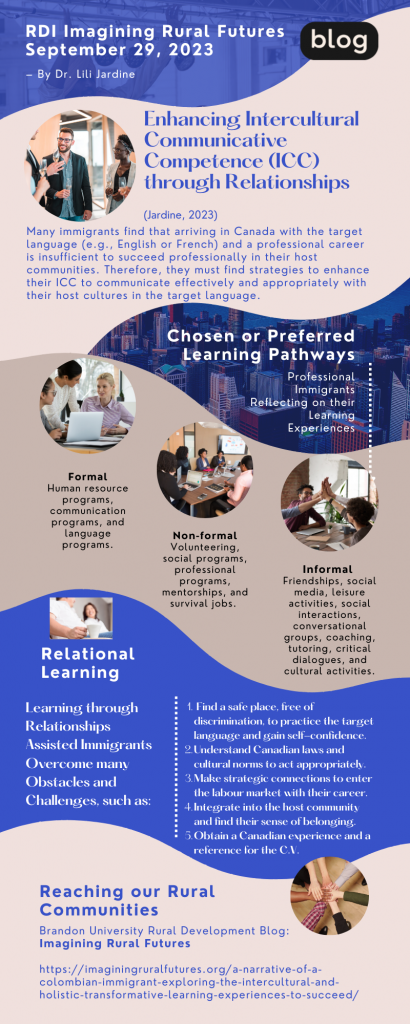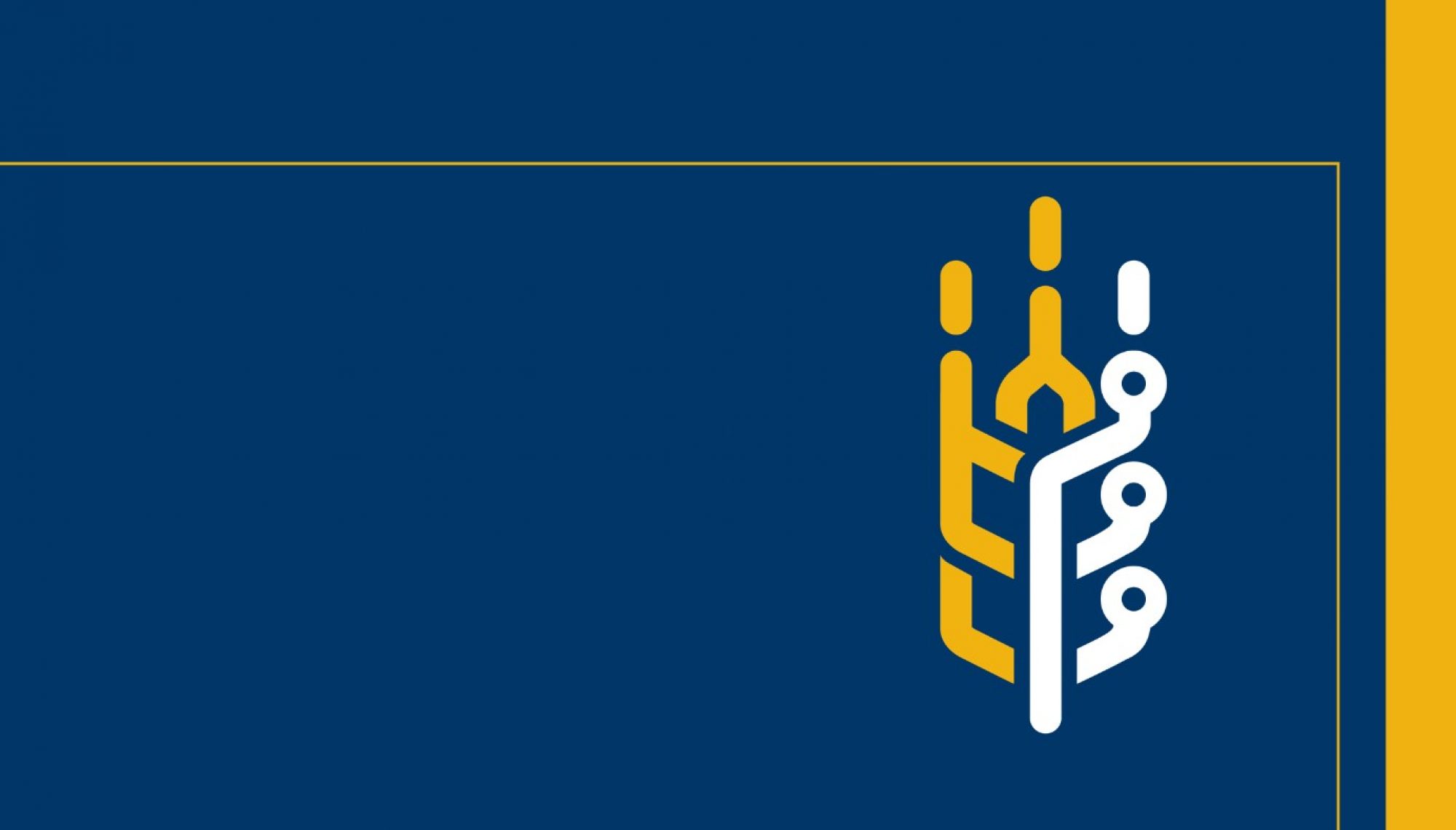By: Lyliam Jardine
September 29, 2023
About the researcher
Dr. Jardine is a sessional instructor at Brandon University and the University of Calgary, and an entrepreneur. Some of her research areas include intercultural competence and transformative learning around immigrants.
Introduction
This blog entry provides a brief summary of my doctoral dissertation in adult learning, exploring the intercultural and holistic transformative learning experiences of professional Colombian immigrants in Canada (Jardine, 2023). In the process of completing this research, I was fascinated to reflect on my learning experiences as an international student in Brandon, Manitoba, from 1989 to 1990, as well as the experiences as a professional Colombian immigrant in Canada from 1998 to present. As an immigrant, I faced many barriers other immigrants face, such as discrimination, unemployment, and poverty. While pursuing professional success as a systems engineer, I took on many roles, such as: teacher, entrepreneur, and most recently a scholar and sessional instructor at two post-secondary institutions. When I was reflecting on my own journey as an immigrant, I was curious to learn from fellow Colombians about the strategies they applied to not only enhance their language and intercultural competency, but also to succeed professionally in Canada. Therefore, as I continued pursuing my professional goals in Canada, the place I call home, I started a Doctor of Education degree (EdD) with a focus on Adult Learning. This led me to the path of my current research, with the goal to help other immigrants. Although, while the research findings only include professional Colombian immigrants, they are relevant to other immigrants in Canada – especially Latin Americans and stakeholders that are involved in an immigrants’ journeys.
Previous studies that explored the experiences of a few Colombian immigrants in Canada uncovered barriers, such as discrimination, poverty, and unemployment (Armony, 2014). The findings of studies centered around refugees, immigrants from one gender, or immigrants from one location or organization. Additionally, most studies grouped Colombians with other Latin American groups; however, though Latin American cultures are similar, they are still some cultural differences, and based on other studies, there is a lack of understanding of the Colombian culture within Canada.
As an emerging scholar in adult learning, I was more curious to uncover strategies to help immigrants succeed professionally. I wanted to provide new strategies to stakeholders that are part of an immigrants’ journeys, so they could assist these immigrants integrate into their host communities (communities of settlement), and succeed professionally in Canada. Finally, I wanted to bridge the connection between holistic Transformative Learning (TL) (Illeris, 2016), an adult learning theory, and Intercultural Communicative Competence (ICC) (Byram, 2021), a model under the educational strand of language and literacy.
Thus, the purpose of this study with narrative inquiry methodology was to explore the journeys of eight professional Colombian immigrants who felt successful in Canada and had two or more years of adaptation and integration to answer the following question:
To what extent did professional Colombian immigrants experience holistic TL, changes in their frames of reference, and enhance their ICC, to communicate appropriately in the target language, after living in Canada for two or more years, in their path to professional success? (Jardine, 2023, p. ii)
Holistic TL is comprised of three interdependent and interconnected dimensions of learning: cognitive, affective, and social. The changes individuals experience when facing a new or challenging situation are experienced through their learning dimension (Illeris, 2016). The cognitive learning dimension refers to knowledge, values, and skills. The affective learning dimension refers to the attitudes and emotions. The social learning dimension refers to the interaction with others and the environment. Along the same line, ICC is comprised of four interdependent and interconnected competences: intercultural, linguistic, sociolinguistic, and discourse.
- ICC Intercultural competence: the ability to become self-aware about one’s own culture and other cultures
- ICC linguistic competence: the ability to speak and understand the target language with the host culture (cultures from their host communities)
- ICC sociolinguistic competence: the ability to communicate appropriately with the host culture in the target language
- ICC discourse competence: the ability to interpret and produce the target language appropriately and effectively.
Methods
This qualitative study located in narrative inquiry was comprised of two rounds of online semi-structured interviews and one demographic survey. With narrative inquiry, I wanted to understand the journeys of my participants (Clandinin, 2020), and collaborate with them to ensure I interpreted their stories in the way they experienced them. Participants were gathered through snowball sampling via email, WhatsApp, and Facebook. Out of 20 prospective participants, eight participants were chosen through a criterion matrix to select those who presented the most variability: coming from different provinces, having different professional careers, and coming from different places within Colombia.
With the criterion matrix, the participants were located in five different provinces, felt professionally successful, and spoke the target language, e.g., English and/or French, during the data collection phase. To keep the identity of the participants safe, I assigned pseudonyms for the participants.
Findings and Discussion
Many of the participants realized that speaking the target language and having a professional career was not enough for them to succeed professionally. For this reason, while the participants navigated life in Canada to integrate into their host communities and succeed professionally, they faced some challenges, such as discrimination, difficulty entering the labour market, difficulty accessing community resources because of their type of visa, challenges while certifying their professional foreign credentials, and lack of confidence to speak the target language. To overcome these challenges and to improve their ICC, participants applied different strategies through informal, nonformal, and formal learning. Most of the strategies to enhance their ICC fostered intercultural connections with individuals from their host communities. While some participants integrated more with their host culture than others, they all found their sense of belonging and were able to enhance their language competence and ICC through relationships, experiencing relational learning (learning through relationships). However, most of the participants found their sense of belonging with other immigrants or in social settings, not in professional settings.

Some informal learning strategies were having “mentors and getting involved in leisure activities” (Claudia, a social worker) that fostered interpersonal connections. Some nonformal learning strategies were connecting with social or professional organizations, such as Rotary, Immigrant Services, and “Toastmasters” (Juliana, a chemical engineer), and “volunteering” (Katherine, a teacher). Volunteering was very important for most participants because they were able to “practice the language in a safe place or a place free of discrimination” (Natalia, a bacteriologist) and “obtain a Canadian experience” (Jorge, a medical doctor).
Some formal learning strategies consisted of obtaining diplomas in fields that required interacting and learning about cultural norms and Canadian laws, such as communications and human resources; these courses helped them communicate effectively and appropriately in professional settings. Although some participants took language courses through post-secondary institutions, these courses were not as popular with the participants because they wanted to have more opportunities to build connections with their peers and extend those relationships outside the classroom setting. Positive and strong interpersonal connections with individuals from their host communities provided participants with a sense of belonging as they integrated and connected with their host cultures; some of their interpersonal connections linked the participants to jobs in their professional fields, as well. Thus, as they interacted with the host culture, they continued enhancing their ICC, by shifting their cultural identity, especially through the intercultural and sociolinguistic ICC competences.
Throughout the participants journeys of overcoming obstacles, learning through relationships, and finding their professional place, they started experiencing changes in their attitudes by becoming more humble, strong, open minded, flexible, and confident. They also realized that they started to behave differently, such as communicating slower, listening more to learn about the culture, and enhancing their linguistic and discourse ICC competences. In sum, after reflecting on their own experiences, they shifted their attitudes, and the way they interacted with individuals from their host communities, experiencing changes in their personality identity. Thus, they experienced various levels of holistic TL. In this study, ICC was an illustration of holistic TL.
The findings of this research serve immigrants, prospective immigrants, and stakeholders that are involved in an immigrants’ learning journeys (e.g., post-secondary institutions, professional certification organizations, community organizations), and government services. While the reader can access the original document (Jardine, 2023), I would like to share some of the implications regarding community development and post-secondary institutions. For example:
- Community organizations could create partnerships with post-secondary institutions to offer volunteering, mentorship, networking, and co-op opportunities to international students and immigrants.
- Additionally, organizations could create internal programs like intercultural dialogues and mentorships to enhance the ICC of all their employees, not only immigrants.
- Two of the many strategies provided for post-secondary institutions are to consider relational pedagogy (Bovill, 2020) and global themes (Magro, 2019). Relational pedagogy refers to students and instructors co-creating knowledge and creating a safe space where building relationships are at the core of the courses. Global themes refer to students becoming aware of other intercultural stories of other immigrants through nonfiction books or local immigrants, which can help enhance their ICC.
Conclusion
The research work to continue assisting immigrants, including international students, does not end with this doctoral dissertation (Jardine, 2023), but rather starts the conversation and awareness around the topic of immigration, ICC, and holistic TL. As I continue disseminating the research findings through presentations, academic articles, and business articles I will continue the work I started here with some initiatives (e.g., hybrid conference for immigrants and conversations with policy makers around hiring practices and human resource services) that were inspired through this research.
So, stay tuned!
Resources:
Publications based on research
Jardine, L. (2023). Exploring the intercultural and holistic transformative learning experiences of professional Colombian immigrants in Canada [Doctoral thesis, University of Calgary]. Open Theses and Dissertations. https://hdl.handle.net/1880/116628
References
Armony, V. (2014). Latin American communities in Canada: Trends in diversity and integration. Canadian Ethnic Studies, 46(3), 7-34. https://doi.org/10.1353/ces.2014.0043
Bovill, C. (2020). Co-creating learning and teaching: Towards relational pedagogy in higher education. Critical Publishing Ltd. https://www.criticalpublishing.com/co-creating-learning-and-teaching
Byram, M. (2021). Teaching and assessing intercultural communicative competence (2nd ed.). Multilingual Matters. https://doi.org/10.21832/BYRAM0244
Clandinin, D. J. (2020). Journeys in narrative inquiry (1st ed.). Routledge. https://doi.org/10.4324/9780429273896-14
Illeris, K. (2016). Learning, development, and education: From learning theory to education and practice. Routledge.
Magro, K. (2019a). Journey of transcultural literacies: Working toward transformative learning in adult literacy education. Adult Literacy Education: The International Journal of Literacy, Language, and Numeracy, 19–32.https://doi.org/10.35847%2Fkmagro.1.2.19
